Aldeburgh Festival, Weekend 1 review - dance to the music of time | reviews, news & interviews
Aldeburgh Festival, Weekend 1 review - dance to the music of time
Aldeburgh Festival, Weekend 1 review - dance to the music of time
From Chekhovian opera to supernatural ballads, past passions return to life by the sea
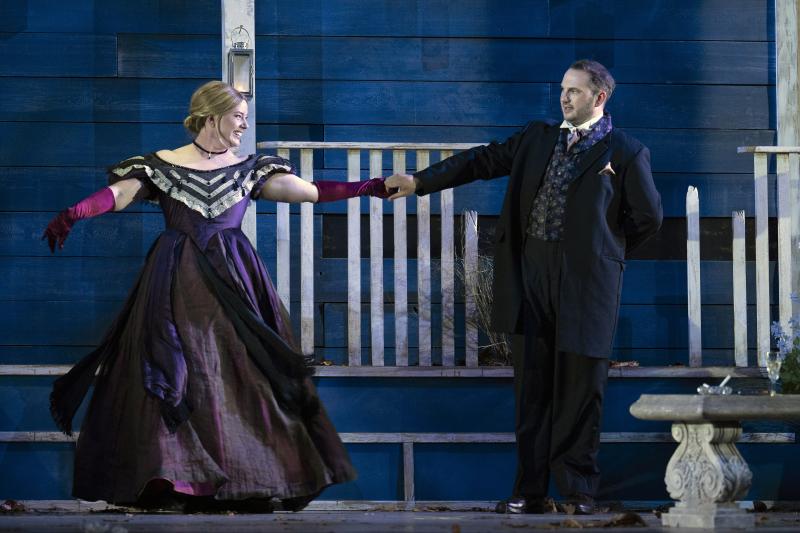
This year’s Aldeburgh Festival – the 76th – takes as its motto a line from Shelley‘s Prometheus Unbound. The poet speaks of despair “Mingled with love and then dissolved in sound”. With or without words, music shapes and voices feelings that would otherwise lie beyond expression.
Shelley’s high-flying Romantic ideals may feel abstruse but, as the Festival’s opening weekend showed, music’s power not just to charm but to heal and reveal can have striking, and practical, real-world effects. Pianist George Xiaoyuan Fu and mezzo-soprano Lotte Betts-Dean prefaced their “Solitude with Schubert” recital in the Britten Studio at Snape Maltings with a film (by Matilda Hay and Rachel Clara Reed) that explored Fu’s collaboration with a walking group for bereaved people in Suffolk. In the shadow of his own father’s death, he played them Schubert; they spoke movingly of the emotions – not facile consolation, but mingled sadness and joy – the music stirred for them.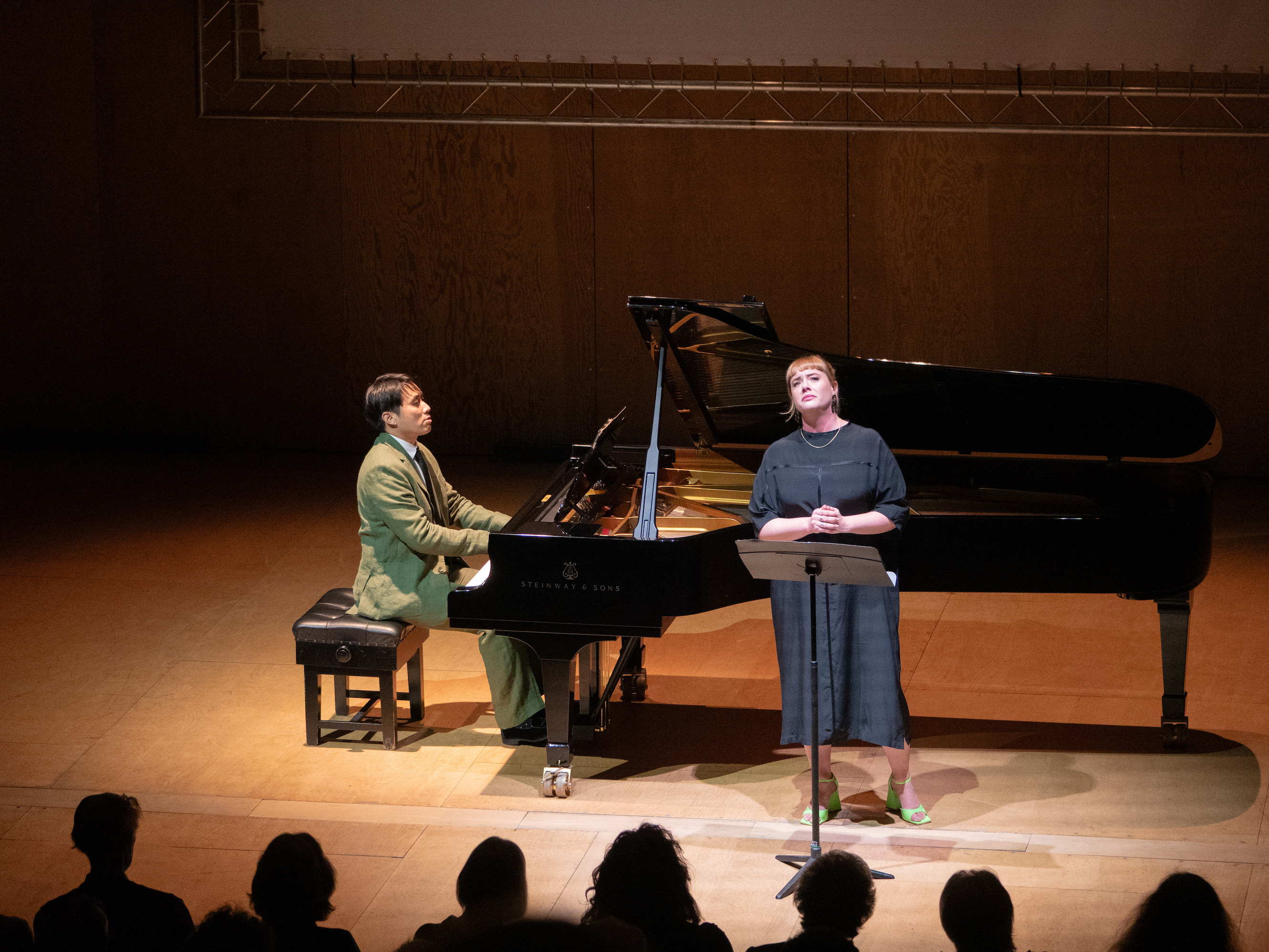 On stage, Betts-Dean (pictured above with George Fu, by Marcus Roth) brought drama, fervour and a contemplative calm to Schubert[‘s cantata-length 1818 song Einsamkeit, with its torn protagonist who veers between longing for a busy public life and craving for the sweet retreat of solitude. As for Fu’s performance of the monumental D960 B flat sonata, it encompassed a rainbow span of expression, from the mingled serenity and dread of the opening through successive stages of tenderness, fury, grief and exultation. Fu revelled in breakneck switches of mood, equally at ease with legato melodic liquidity and smashing chordal declamations. When you play, Fu comments in the film, “you strip yourself bare of all shields”. For all his pianistic agility, this was a Schubert of naked vulnerability, unafraid of contradiction but also assured that clashing passions may eventually be “dissolved in sound”.
On stage, Betts-Dean (pictured above with George Fu, by Marcus Roth) brought drama, fervour and a contemplative calm to Schubert[‘s cantata-length 1818 song Einsamkeit, with its torn protagonist who veers between longing for a busy public life and craving for the sweet retreat of solitude. As for Fu’s performance of the monumental D960 B flat sonata, it encompassed a rainbow span of expression, from the mingled serenity and dread of the opening through successive stages of tenderness, fury, grief and exultation. Fu revelled in breakneck switches of mood, equally at ease with legato melodic liquidity and smashing chordal declamations. When you play, Fu comments in the film, “you strip yourself bare of all shields”. For all his pianistic agility, this was a Schubert of naked vulnerability, unafraid of contradiction but also assured that clashing passions may eventually be “dissolved in sound”.
At Blythburgh church, as the sun set in lingering glory across the marshes, the vocal group EXAUDI and their conductor-composer James Weeks approached the transition between feelings, words and music in a more austere and enigmatic vein. In Book of Flames and Shadows, Weeks and his six singers braid Renaissance poetic texts on love by Petrarch and Pietro Bembo with Weeks’s own spare and fragmentary pieces, and an interwoven sequence of madrigals by the 16th-century composer Jacques Arcadelt. In Weeks’s work, with the excellent EXAUDI ensemble (pictured below by Marcus Roth) accompanied by Sophie Appleton’s violin, words and music break down into isolated cells and chunks – stray syllables, notes, phrases. At length the (relative) polyphonic richness of the Arcadelt madrigals gather these solitary elements into a nourishing plenitude of harmony and feeling. Immaculately executed, it made for a tantalising if gnomic experience – almost a creation myth for the post-Renaissance vocal music of love and longing that we now take for granted. But then Aldeburgh has the special ability to take its willing audience on adventurous – even exacting – musical journeys in settings as blessed as Blythburgh at sunset.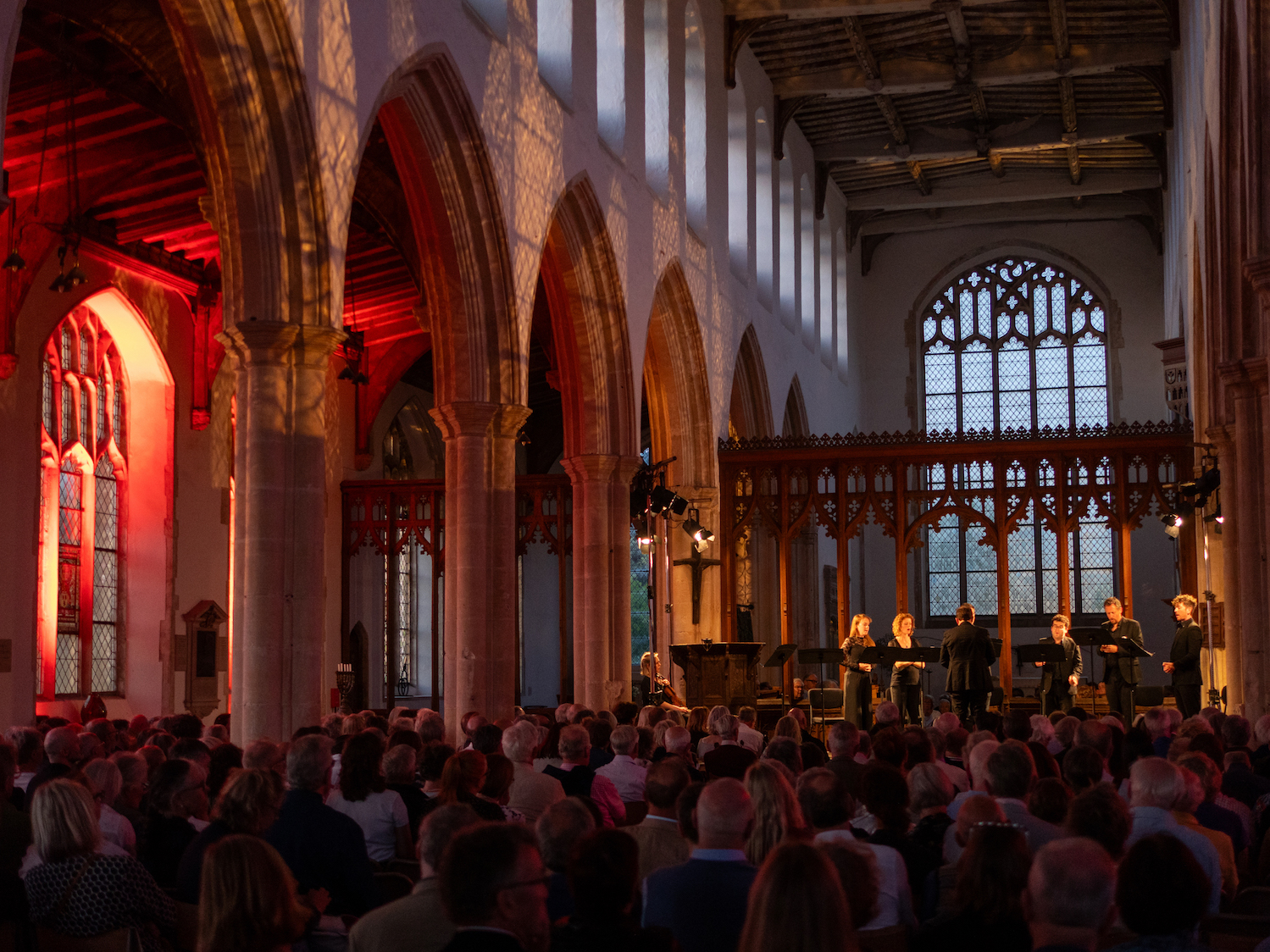 In the Snape Maltings hall, the Festival’s opening splash arrived in the form of Colin Matthews’s Chekhov-inspired opera A Visit to Friends, with a libretto by William Boyd (the novelist’s first) based on a Chekhov story and his own play, Longing. Matthews and Boyd present an opera-within-an-opera, as a modern company rehearses a rediscovered piece supposedly written by Chekhov himself with a score by an unknown composer. In Rachel Hewer’s production, designed by Leanne Vandenbussche, a revolving stage swings us between the contemporary rehearsal room and the Russian country house of the “original” opera.
In the Snape Maltings hall, the Festival’s opening splash arrived in the form of Colin Matthews’s Chekhov-inspired opera A Visit to Friends, with a libretto by William Boyd (the novelist’s first) based on a Chekhov story and his own play, Longing. Matthews and Boyd present an opera-within-an-opera, as a modern company rehearses a rediscovered piece supposedly written by Chekhov himself with a score by an unknown composer. In Rachel Hewer’s production, designed by Leanne Vandenbussche, a revolving stage swings us between the contemporary rehearsal room and the Russian country house of the “original” opera.
Art and (onstage) life meld and blur. The opera and its singers repeat the same motif of two women (Lotte Betts-Dean and soprano Susanna Hurrell) smitten by the same apparently charming but commitment-dodging man (baritone Marcus Farnsworth). Director Gregor (Edward Hawkins’s fruity bass-baritone) tries vainly to keep the feelings of the piece and its players separate, while Gary Matthewman is the stalwart rehearsal pianist. As presiding spirit, the famously commitment-averse Chekhov himself briefly appears at the start and close – accompanied by a distinctly real dog.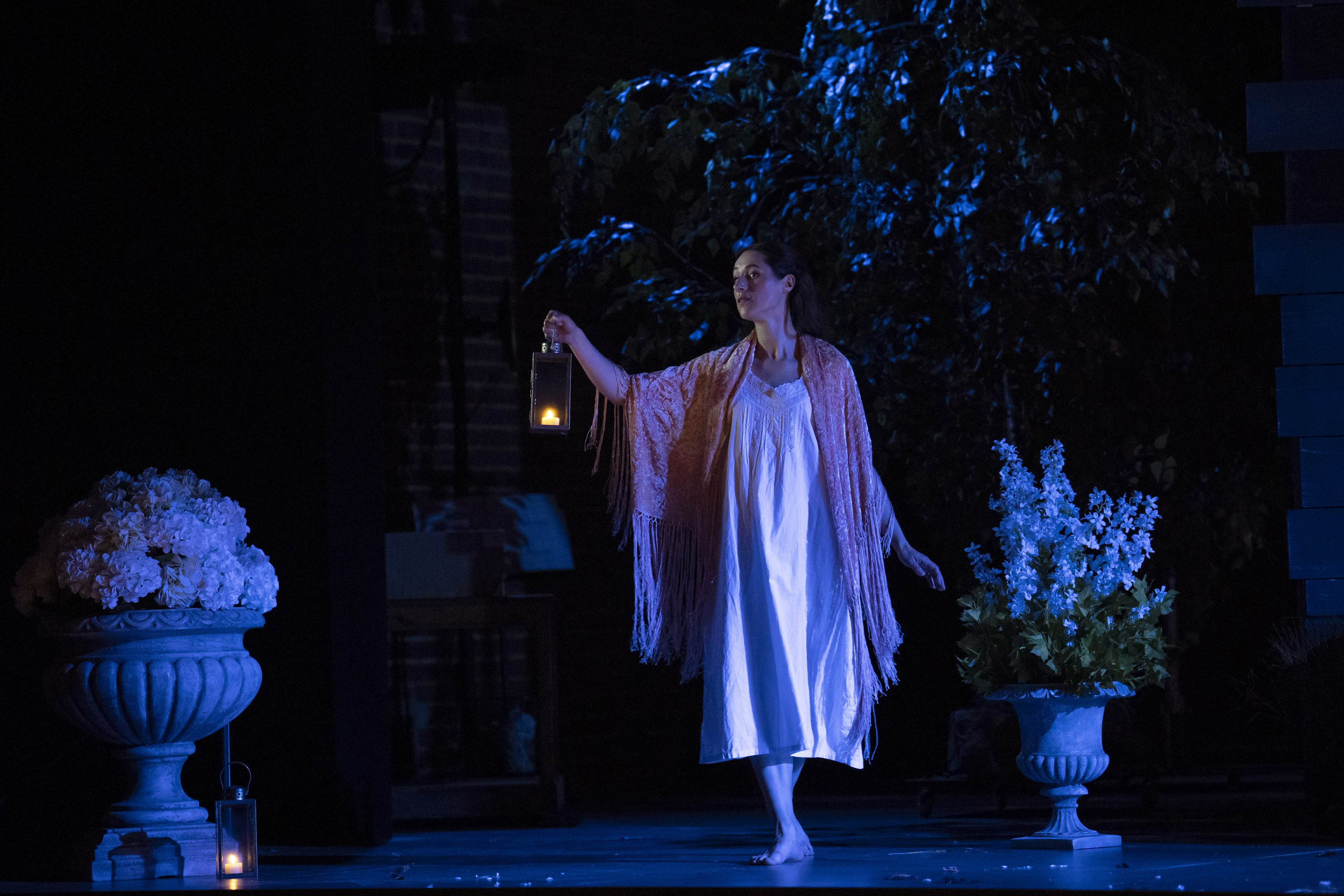 Lighting and video design (Danny Vavrečka and Sasha Owen) effectively echo the romantic turmoil of the characters, and the run-down rustic charm of the (operatic) estate adds to the Cherry Orchard ambience. I felt that Hewer, following Boyd and Matthews, spun the revolve distractingly often as the double love-triangle, both in the piece and among the players, pursued its parallel course. But Betts-Dean in particular, as singer Vanessa and character Varia, brought emotional subtlety and vocal strength to each side of her role. In her case, character and performer never quite coincide; she made that distance touchingly clear. Farnsworth too made his onstage Misha more attractive than the cynical Marcus who plays him, while Hurrell’s Nadia/Natalie (pictured above by Richard Hubert Smith) found impassioned sincerity as well as heedless naivety in her yearning for the man who always gets away.
Lighting and video design (Danny Vavrečka and Sasha Owen) effectively echo the romantic turmoil of the characters, and the run-down rustic charm of the (operatic) estate adds to the Cherry Orchard ambience. I felt that Hewer, following Boyd and Matthews, spun the revolve distractingly often as the double love-triangle, both in the piece and among the players, pursued its parallel course. But Betts-Dean in particular, as singer Vanessa and character Varia, brought emotional subtlety and vocal strength to each side of her role. In her case, character and performer never quite coincide; she made that distance touchingly clear. Farnsworth too made his onstage Misha more attractive than the cynical Marcus who plays him, while Hurrell’s Nadia/Natalie (pictured above by Richard Hubert Smith) found impassioned sincerity as well as heedless naivety in her yearning for the man who always gets away.
If this staging felt at times too elaborate and intrusive for the limited, repetitive action it mounts, Matthews’s lovingly-crafted score (played by the Aurora Orchestra under Jessica Cottis) never lost its grip. A group of works by Scriabin from around 1900 have furnished him with a harmonic language – lush, rich but also ambiguous and unsettled – that makes a smart match for the mixed desires of characters and players. Maybe the moonlit “Russian” love scenes channel other stylistic voices too (from Tchaikovsky to Puccini), while the glowing string sheen of the orchestral interludes have an almost Mahlerian tinge. But this music never sounds merely like pastiche, even as a heady waltz marks Varia's doomed pleas to Misha for a kiss to in the central scene. Matthews not only inhabits an often-sumptuous fin-de-siècle idiom – sensuously delivered by Cottis and the Aurora – with total commitment. In the rehearsal scenes, he dextrously switches to a more contemporary register. For its part, Boyd’s libretto sounds not just robustly singable but, at moments of heightened feeling, discreetly poetic too.
Matthews’s visit to the sonic landscape of Scriabin reminds us that – following Britten’s lead – Aldeburgh has always striven not so much to preserve tradition as transform it. Conducted by Ryan Wigglesworth, festival house-band the Knussen Chamber Orchestra dragged the past into kicking, pulsing life in “Nocturne and Folk”. Two pieces by Britten (the late Suite on English Folk Tunes: “A Time there was”, and the song-cycle Nocturne) partnered Helen Grime’s song sequence for soprano and orchestra, Folk, and (a startling choice) Beethoven’s Eighth Symphony. By the end, I think I grasped the point.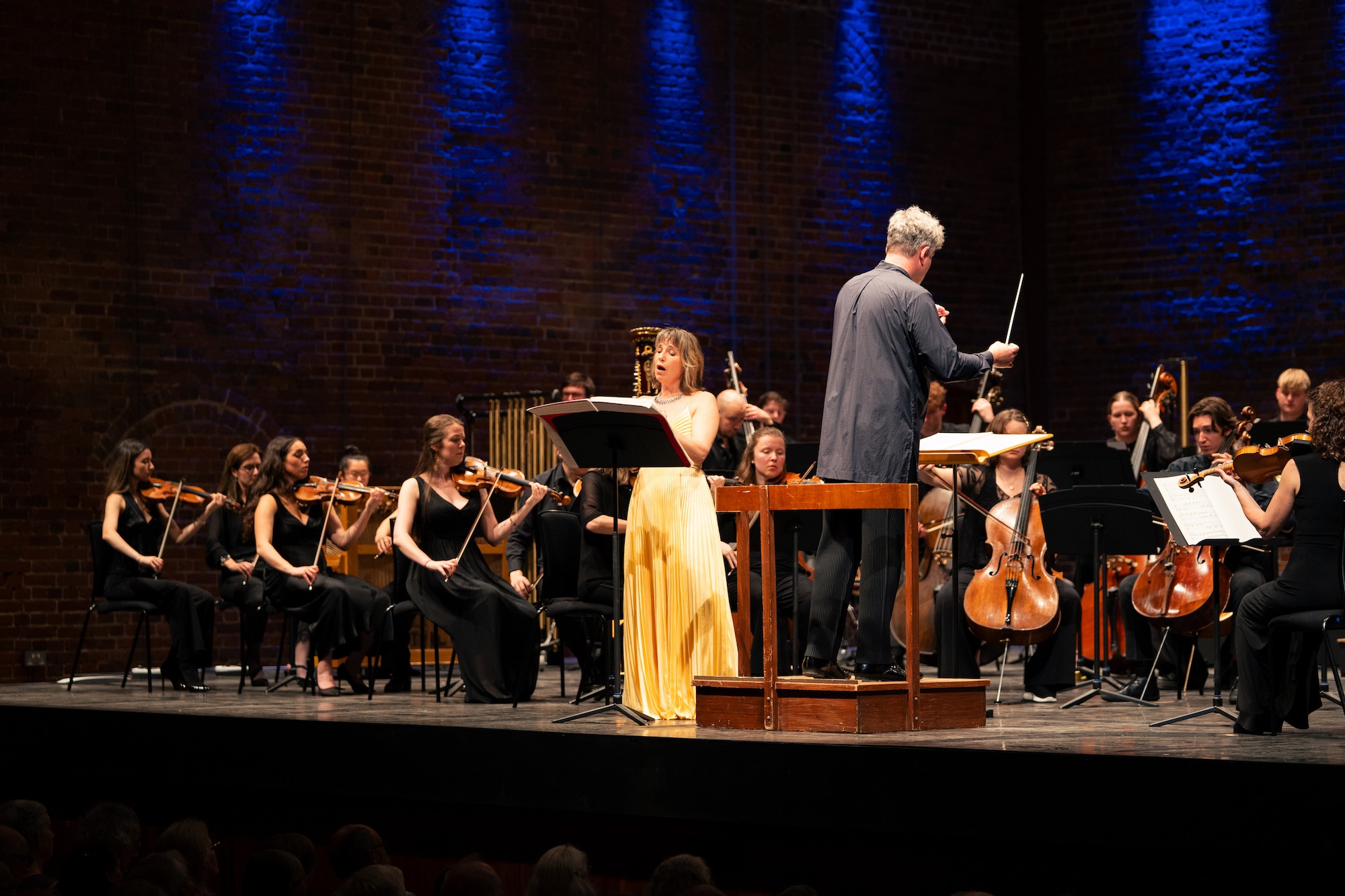 Sardonic, ironic, haunted by songs and sounds it will never quite recapture, the Britten suite elicited both rustic mischief and aching lyricism from the Knussen players. A bristling, angular modernity frames the snatches of traditional numbers we hear from winds, strings, harp and bells. Yet those folk sonorities surface only in threadbare patches until, in the final “Lord Melbourne”, the wistful cor anglais solo allows us fully to enter the elusive past. Likewise, Grime’s Folk both invokes vernacular melody and rhythm – often with delirious drive – and keeps those forces at a distance. Historic modes shadow but never constrain this music, audibly folk-like but closer in spirit to Bartók (or perhaps Peter Maxwell Davies) than Vaughan Williams.
Sardonic, ironic, haunted by songs and sounds it will never quite recapture, the Britten suite elicited both rustic mischief and aching lyricism from the Knussen players. A bristling, angular modernity frames the snatches of traditional numbers we hear from winds, strings, harp and bells. Yet those folk sonorities surface only in threadbare patches until, in the final “Lord Melbourne”, the wistful cor anglais solo allows us fully to enter the elusive past. Likewise, Grime’s Folk both invokes vernacular melody and rhythm – often with delirious drive – and keeps those forces at a distance. Historic modes shadow but never constrain this music, audibly folk-like but closer in spirit to Bartók (or perhaps Peter Maxwell Davies) than Vaughan Williams.
Grime takes her cue from Zoe Gilbert’s novel Folk, set in a fantastic version of the Isle of Man. Soprano Claire Booth (pictured above by Angus Cooke) sings four ribald and eerie songs about supernatural sea-creatures as the orchestra skitters, skirls, drones, keens and chimes behind. Ghosts of faraway fiddles, drums and pipes haunt tales of women enraptured by sea-beasts. Violence, desire and a frisson of the supernatural merge. Wigglesworth and the KCO drew Grime’s uncanny seascape with a bold, vivid (and loud) palette; all credit to Booth’s impassioned and eloquent airs and narrations for keeping her head, and voice, above these swirling waters.
In Britten’s Nocturne, tenor Allan Clayton found a hypnotic and compelling route through these seven disparate settings of poems about sleep and dreams. From Tennyson to Keats, Wordsworth, Wilfred Owen and Shakespeare, Britten’s word-painting depicts the nocturnal realm not as a place of rest and retreat but of intense inner drama, as the night-wandering voice wrestles in dialogue with one obbligato instrumental part after another. Clayton made his endlessly nuanced and shaded tenor open up into roaring waves of sound, or shrink back to a fragile, silvery reed. As harp, horn, flute and bassoon both accompany the dreamer and challenge or disrupt him, Clayton (pictured below by Angus Cooke) segued from mystery (Coleridge) to comedy (Thomas Middleton) and the operatic psychodrama of Britten’s Wordsworth setting – all with an expressive versatility that confirmed his huge gifts.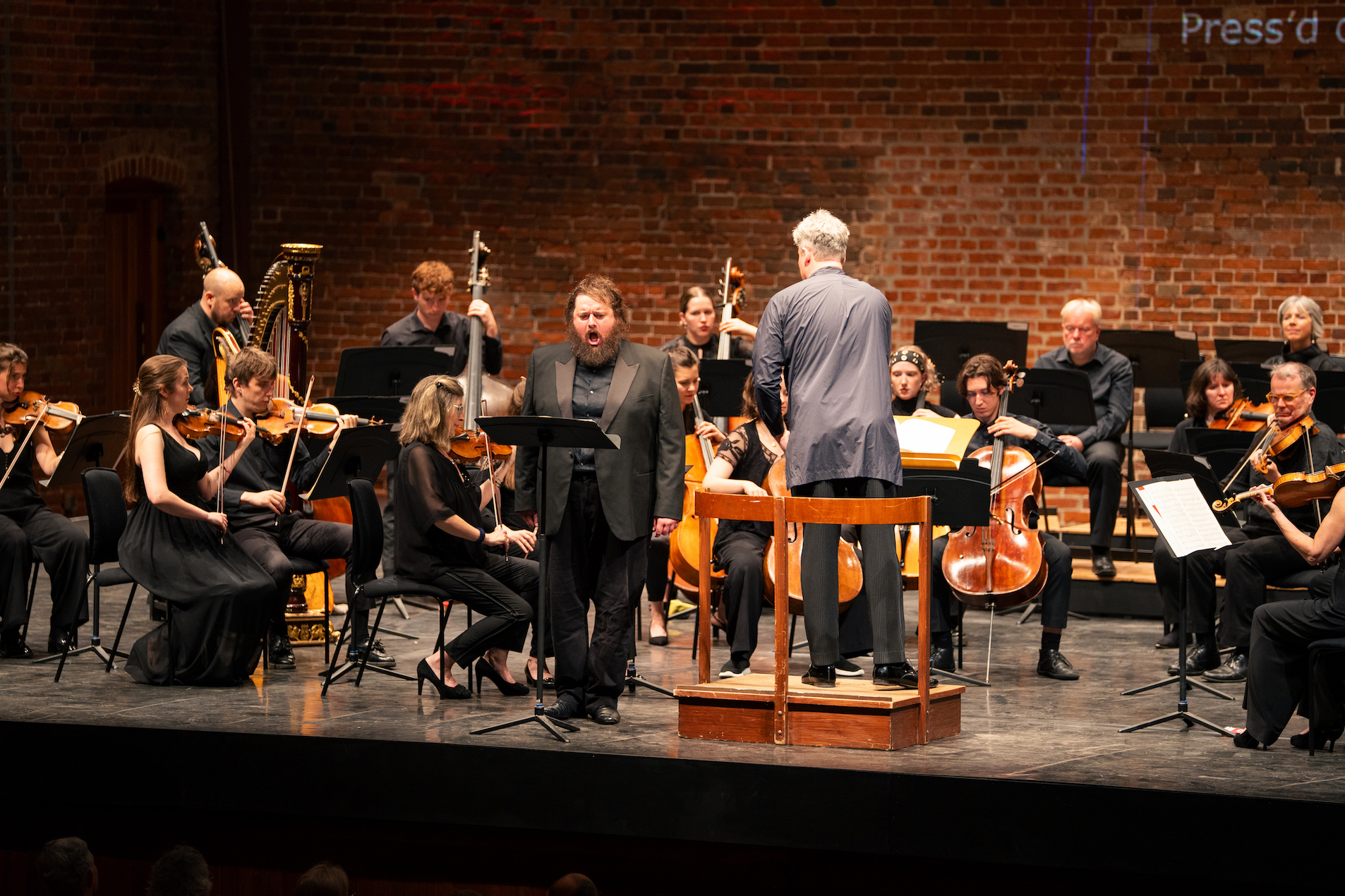 But what was Beethoven’s late homage to Haydn and neo-classical form doing in this ecstatic and visionary company? After a few bars of the Eighth, we could tell. Wigglesworth and the Knussens made this droll, bouncy and skittish work into a wild ride whose affable geniality threatened to tip over into unhinged frenzy. The dance-like tunes sounded not decorous but deranged, virtually on the edge of collapse as Beethoven scrambles and crashes one rollicking theme into another. Played with and almost scary dash and brio, this was an Eighth that took the polite styles of its composer’s youth and subjected them to a manic process of parody and exaggeration. Sometimes you have to maintain tradition by blowing it sky-high.
But what was Beethoven’s late homage to Haydn and neo-classical form doing in this ecstatic and visionary company? After a few bars of the Eighth, we could tell. Wigglesworth and the Knussens made this droll, bouncy and skittish work into a wild ride whose affable geniality threatened to tip over into unhinged frenzy. The dance-like tunes sounded not decorous but deranged, virtually on the edge of collapse as Beethoven scrambles and crashes one rollicking theme into another. Played with and almost scary dash and brio, this was an Eighth that took the polite styles of its composer’s youth and subjected them to a manic process of parody and exaggeration. Sometimes you have to maintain tradition by blowing it sky-high.
A gentler dialogue between past and present came in Mishka Rushdie Momen’s recital, Darknesse Visible. The young pianist interspersed Elizabethan keyboard pieces (from her album Reformation) with recent works by George Benjamin, Daniel Kidane and Thomas Adès: “Darknesse Visible”, his self-described “explosion” of a John Dowland song. Lucid, virtuosic but always sensitive to her material, Rushdie Momen (pictured below by Marcus Roth) played the earlier repertoire with exemplary grace, poise and power. Harpsichord purists, or any sceptics about the use of a modern piano in keyboard works of this period, should listen and take note. She avoids both pseudo-Romantic anachronism and an, equally false, prissy austerity of tone. 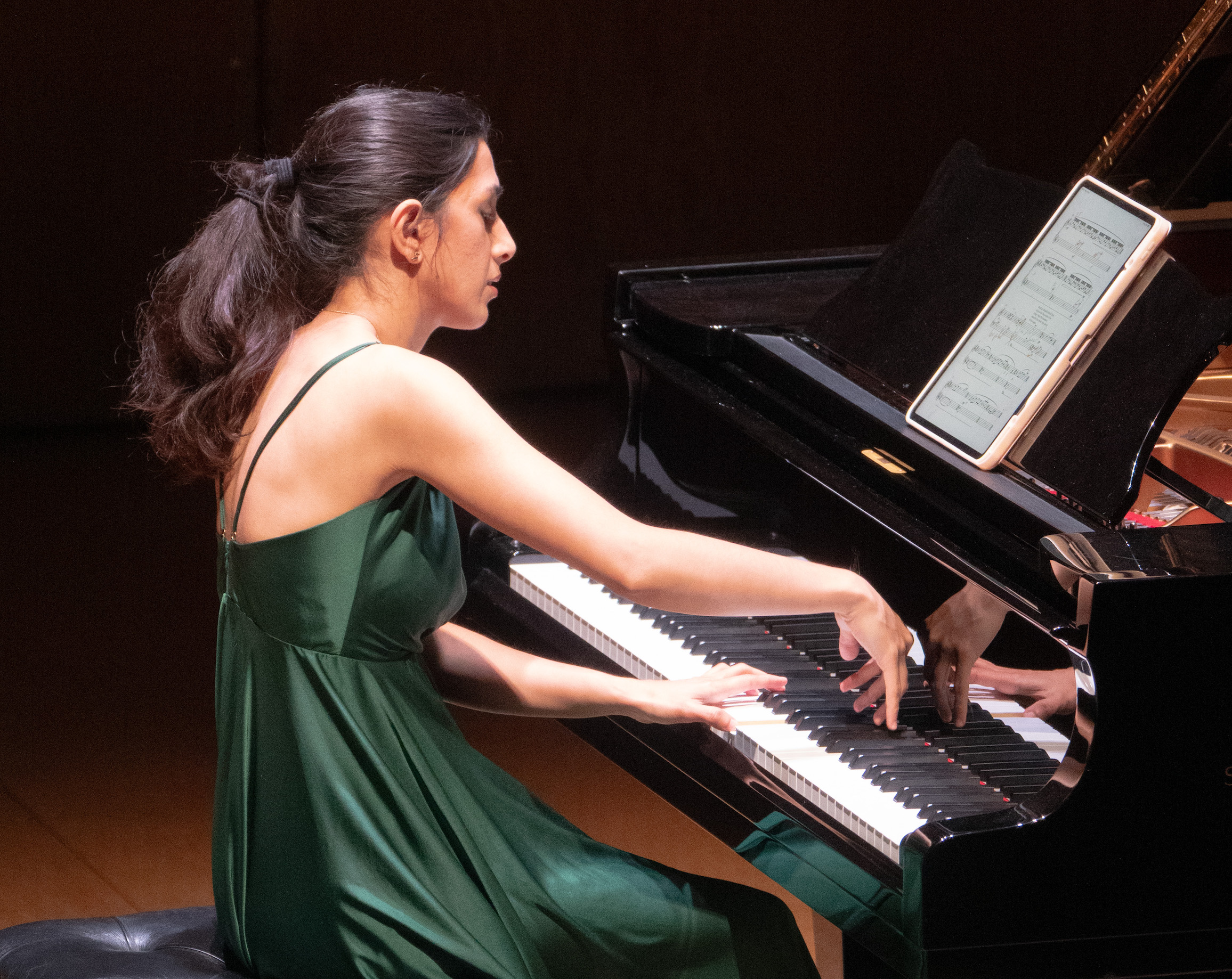 Pieces such as John Bull’s brilliant 30 variations on the song “Walsingham”, or Byrd’s extraordinary showpiece “The Bells”, illustrated her argument. This music, beyond its technical extravagance, implicitly voices a nostalgia for a Catholic artistry quashed by the Protestant Reformation. In the evocation of keyboard canons and preludes past in Benjamin’s Shadowlines (also a dazzling compositional tour de force), we can perhaps also hear whispers of harmonic nostalgia alongside structural rigour. So this century-hopping programme might equally count as a journey into the music of grief and loss. Rushdie Momen too gave us elegiac echoes of a vanished world whose feelings and beliefs endure only because they have been “dissolved in sound”
Pieces such as John Bull’s brilliant 30 variations on the song “Walsingham”, or Byrd’s extraordinary showpiece “The Bells”, illustrated her argument. This music, beyond its technical extravagance, implicitly voices a nostalgia for a Catholic artistry quashed by the Protestant Reformation. In the evocation of keyboard canons and preludes past in Benjamin’s Shadowlines (also a dazzling compositional tour de force), we can perhaps also hear whispers of harmonic nostalgia alongside structural rigour. So this century-hopping programme might equally count as a journey into the music of grief and loss. Rushdie Momen too gave us elegiac echoes of a vanished world whose feelings and beliefs endure only because they have been “dissolved in sound”
- The Aldeburgh Festival continues until 29 June
- More classical reviews on theartsdesk
Share this article
The future of Arts Journalism
You can stop theartsdesk.com closing!
We urgently need financing to survive. Our fundraising drive has thus far raised £49,000 but we need to reach £100,000 or we will be forced to close. Please contribute here: https://gofund.me/c3f6033d
And if you can forward this information to anyone who might assist, we’d be grateful.

Subscribe to theartsdesk.com
Thank you for continuing to read our work on theartsdesk.com. For unlimited access to every article in its entirety, including our archive of more than 15,000 pieces, we're asking for £5 per month or £40 per year. We feel it's a very good deal, and hope you do too.
To take a subscription now simply click here.
And if you're looking for that extra gift for a friend or family member, why not treat them to a theartsdesk.com gift subscription?
more Classical music
 Jansen, LSO, Pappano, Barbican review - profound and bracing emotional workouts
Great soloist, conductor and orchestra take Britten and Shostakovich to the edge
Jansen, LSO, Pappano, Barbican review - profound and bracing emotional workouts
Great soloist, conductor and orchestra take Britten and Shostakovich to the edge
 Jakub Hrůša and Friends in Concert, Royal Opera review - fleshcreep in two uneven halves
Bartók kept short, and a sprawling Dvořák choral ballad done as well as it could be
Jakub Hrůša and Friends in Concert, Royal Opera review - fleshcreep in two uneven halves
Bartók kept short, and a sprawling Dvořák choral ballad done as well as it could be
 Hadelich, BBC Philharmonic, Storgårds, Bridgewater Hall, Manchester review - youth, fate and pain
Prokofiev in the hands of a fine violinist has surely never sounded better
Hadelich, BBC Philharmonic, Storgårds, Bridgewater Hall, Manchester review - youth, fate and pain
Prokofiev in the hands of a fine violinist has surely never sounded better
 Monteverdi Choir, ORR, Heras-Casado, St Martin-in-the-Fields review - flames of joy and sorrow
First-rate soloists, choir and orchestra unite in a blazing Mozart Requiem
Monteverdi Choir, ORR, Heras-Casado, St Martin-in-the-Fields review - flames of joy and sorrow
First-rate soloists, choir and orchestra unite in a blazing Mozart Requiem
 Cho, LSO, Pappano, Barbican review - finely-focused stormy weather
Chameleonic Seong-Jin Cho is a match for the fine-tuning of the LSO’s Chief Conductor
Cho, LSO, Pappano, Barbican review - finely-focused stormy weather
Chameleonic Seong-Jin Cho is a match for the fine-tuning of the LSO’s Chief Conductor
 Classical CDs: Shrouds, silhouettes and superstition
Cello concertos, choral collections and a stunning tribute to a contemporary giant
Classical CDs: Shrouds, silhouettes and superstition
Cello concertos, choral collections and a stunning tribute to a contemporary giant
 Appl, Levickis, Wigmore Hall review - fun to the fore in cabaret and show songs
A relaxed evening of light-hearted fare, with the accordion offering unusual colours
Appl, Levickis, Wigmore Hall review - fun to the fore in cabaret and show songs
A relaxed evening of light-hearted fare, with the accordion offering unusual colours
 Lammermuir Festival 2025, Part 2 review - from the soaringly sublime to the zoologically ridiculous
Bigger than ever, and the quality remains astonishingly high
Lammermuir Festival 2025, Part 2 review - from the soaringly sublime to the zoologically ridiculous
Bigger than ever, and the quality remains astonishingly high
 BBC Proms: Ehnes, Sinfonia of London, Wilson review - aspects of love
Sensuous Ravel, and bittersweet Bernstein, on an amorous evening
BBC Proms: Ehnes, Sinfonia of London, Wilson review - aspects of love
Sensuous Ravel, and bittersweet Bernstein, on an amorous evening
 Presteigne Festival 2025 review - new music is centre stage in the Welsh Marches
Music by 30 living composers, with Eleanor Alberga topping the bill
Presteigne Festival 2025 review - new music is centre stage in the Welsh Marches
Music by 30 living composers, with Eleanor Alberga topping the bill
 Lammermuir Festival 2025 review - music with soul from the heart of East Lothian
Baroque splendour, and chamber-ensemble drama, amid history-haunted lands
Lammermuir Festival 2025 review - music with soul from the heart of East Lothian
Baroque splendour, and chamber-ensemble drama, amid history-haunted lands
 BBC Proms: Steinbacher, RPO, Petrenko / Sternath, BBCSO, Oramo review - double-bill mixed bag
Young pianist shines in Grieg but Bliss’s portentous cantata disappoints
BBC Proms: Steinbacher, RPO, Petrenko / Sternath, BBCSO, Oramo review - double-bill mixed bag
Young pianist shines in Grieg but Bliss’s portentous cantata disappoints

Add comment